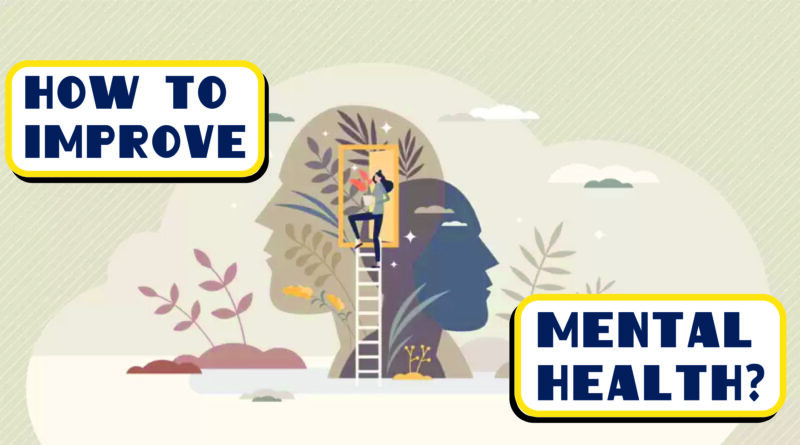How to Improve Mental Health?
What is Mental Health?
Mental health encompasses our emotional, psychological, and social well-being, influencing our thoughts, emotions, and behaviors as we navigate life’s challenges. It plays a crucial role in shaping our responses to stress, our relationships with others, and our decision-making processes. Mental health holds significance throughout every phase of life, spanning from childhood and adolescence to adulthood and the aging process.
How can I Improve My Mental Health?
There are various actions you can take to enhance your mental health, such as:
1. Stay Positive
Maintaining a positive perspective is crucial, and there are several strategies to achieve this:
Finding Emotional Balance:
Strive for a healthy equilibrium between positive and negative emotions. It’s natural to experience feelings like sadness or anger, as they can be valuable in helping you navigate challenging situations. These emotions can serve as signals, prompting you to address issues. However, it’s essential not to let these emotions overwhelm you. Avoid dwelling on past traumas or excessively worrying about the future.
Embrace Positive Emotions:
When you experience positive emotions, try to savor them and make the most of them. Enjoy the joy, contentment, or happiness when they arise, and allow them to uplift your spirits.
Limit Exposure To Negative Information:
Be mindful of the information you consume. Sometimes, taking a break from excessive exposure to negative news or content can be beneficial. While staying informed is essential, it’s also crucial to recognize when to step away and give yourself respite. Seek support and connection on social media, but be cautious about engaging in arguments, spreading rumors, or making unfavorable comparisons with others’ lives. Instead, focus on positive interactions and connections.
2. Engaging In The Practice Of Gratitude
Practicing gratitude involves acknowledging and appreciating the positive aspects of your life. This can be done daily by reflecting on or recording the things you’re thankful for. These sources of gratitude can vary in size, from the significant support of loved ones to the small joys of a delicious meal. It’s crucial to take a moment to relish these positive experiences. Gratitude practice can shift your perspective, helping you view your life through a more positive lens. For instance, during times of stress, you may overlook the moments when you experience positive emotions. Gratitude can assist in recognizing and valuing these moments.
3. Role of Sleep In Mental Health

Source: Entrepreneur
There is substantial evidence confirming that sleep is vital not only for our physical well-being but also for our mental health. Inadequate or poor-quality sleep has been shown to amplify negative emotional reactions to stressors and diminish positive emotions.
4. Mindfulness And Meditation
Meditation is a mind and body practice that centers on honing your ability to concentrate your attention and awareness. Various forms of meditation exist, including mindfulness meditation and transcendental meditation. Typically, meditation encompasses the following elements:
Quiet Environment:
It’s advisable to choose a tranquil location with minimal distractions.
Comfortable Posture:
You can adopt various postures for meditation, such as sitting, lying down, walking, or another position that suits you best.
The Focus Of Attention:
During meditation, you concentrate on a specific focal point, which could be a selected word or phrase, an object, or your own breathing.
Open Attitude:
An essential aspect of meditation is maintaining an open attitude. This means allowing distractions to enter and exit your consciousness naturally, without passing judgment on them.
5. Look After Your Physical Health
Prioritizing your physical health significantly contributes to the enhancement of your mental well-being and overall quality of life. Incorporate the following practices into your routine:
Stay Physically Active:
Dedicate at least 30 minutes each day to physical activity, which can include activities like running, walking, practicing yoga, dancing, cycling, or even tending to your garden.
Adopt A Balanced Diet:
Consume a nutritious and well-balanced diet rich in fruits, vegetables, lean proteins, and whole grains to nourish your body and mind.
Ensure Adequate Sleep:
Get enough restorative sleep to support cognitive function and emotional well-being.
6. Relaxation Techniques
Relaxation techniques are practices aimed at eliciting your body’s innate relaxation response. These techniques serve to slow down your breathing, reduce blood pressure, alleviate muscle tension, and mitigate stress. Several types of relaxation techniques include:
Progressive Relaxation:
In this method, you intentionally tense and subsequently release different muscle groups, often in conjunction with mental imagery or controlled breathing exercises.
Guided Imagery:
Guided imagery involves the process of concentrating on positive mental images to induce a state of relaxation and heightened focus.
Biofeedback:
Through the use of electronic devices, biofeedback helps individuals gain control over specific bodily functions like breathing, heart rate, and muscle tension.
Self-Hypnosis:
This technique aims to guide you into a relaxed, trance-like state by responding to particular suggestions or cues.
Deep Breathing Exercises:
Deep breathing exercises entail focusing on taking deliberate, slow, and deep breaths to promote relaxation.
Engaging in these relaxation techniques can be valuable for reducing stress and enhancing overall well-being.
6. A Good Work-Life Balance

A healthy work-life balance is a unique concept for each individual. It’s not about strictly dividing your time evenly between work and leisure activities but rather about ensuring fulfillment and contentment in both aspects of your life. A well-balanced life might involve:
Meeting Work Deadlines While Enjoying Social and Hobbies:
It means successfully managing your work commitments while also allocating time for friends and pursuing hobbies that bring you joy.
Prioritizing Sleep and Nutrition:
It involves having adequate time for proper sleep and maintaining a nutritious diet to support your overall well-being. Source: Forbes
Maintaining Boundaries:
It means not letting work-related worries encroach upon your personal life, allowing you to relax and unwind when you’re at home.
Ultimately, a healthy work-life balance is about tailoring your daily routine to achieve a sense of contentment and fulfillment in both your professional and personal spheres.
7. Seek Professional Help
If you find yourself struggling to manage the stress you’re experiencing, it’s crucial to reach out for professional assistance. You can contact your local mental health helpline or reach out to your counselor or doctor. Always remember that you are not alone, and there are steps you can take to nurture and support your emotional well-being.
